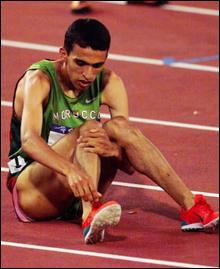
Hicham El Guerrouj is despondent after coming second
in the men's 1,500m. Photo: IAIN GILLESPIE
By ROY MASTERS
9:11PM, September 29, 2000
It was a heart stirring, throat closing spectacle, with incredible sadness at the end.
While the athletic world will rejoice the victory of Kenya's Noah Ngeny in the 1500 metres last night, many were heavy in the heart for the second place getter, Morocco's Hicham El Guerrouj.
Metric milers are spiritual men who seek salvation in their lives and their lanes and the Moroccan, in the inside lane, was seeking atonement for his fall in Atlanta when he came last, caused by his fall in the bell lap in an elbowing, spiking, jostling tactical race.
Yet there was no jostling or changing of pace last night in the same event at the Sydney Games, nothing to divert energy from the simple task of Ngeny and El Guerrouj running fast.
El Guerrouj took the lead in the third lap after running in the slip stream of compatriot Youssef Baba and was ahead of the field midway down the final straight.
However, Ngeny, the master of the late race rush, charged him down and won by one and a half stately metres.
The Kenyan's final move was swift and brutal.
El Guerrouj, double world champion, world record holder, loser of only one race since falling in Atlanta, had nothing left.
Ngeny set an Olympic record of 3:32.07, surpassing Sebastien Coe's record of 3:32.53, set in '84.
Both ran with a delightful light stride which reflects minimal effort.
While both runners have the classic development for the metric mile, being lean, the Kenyan was taller.
El Guerrouj, improbably high waisted, spare of frame, with little development in an upper body that is usually almost still as he runs, crossed the line and sat almost motionless, yet resigned to his loss.
His rabbit, Baba, setting an insane pace, came a long last, 11 seconds behind the second last runner.
The twelve athletes who took the field have spent their lives under the tyranny of the clock, all men who set goals and then chase them down, but hate being the tangible target of the front runner in their own specialty.
The two Moroccans broke from the pack early in the second lap, meaning the race was not the moving knot of controlled tension about to erupt which gives the 1500 metres its great excitement.
It is the perfect race to watch runners balance speed, race judgment and their own character. Ngeny, who comes from the Kenyan town of Eldoret, the hometown of Moses Kiptanui, Daniel Komen and Kip Keino, has the character bred from the high plains.
The Olympic record set was at odds with world records have been pursued in recent years in almost sterile laboratory conditions, attempts which are less true races than rich time trials where one runner selects his speed, his pacers and hides behind them.
It was not the usual record sight of one solitary athlete straining against the clock and no one else over the final lap.
Being an Olympic record, it was set in the arena of competition, where runners have to remain alert and keep their cunning, despite the waves of tiredness and fogs of fatigue which sweep over them.
In the final analysis, it was Ngeny who harboured his strength for the final assault on the homestretch.
When England's Roger Bannister broke the four minute barrier in May, 1954, it had been an almost cosmic obstacle which had withstood years of yearning, a neatly ordained figure of four point zero minutes for four laps, or four 440's,
A half century later, Herb Elliott suggests Australian athletes, who did not make the final in Sydney, have established another mental barrier to the 1500 metres.
Elliott never lost a mile or a 1500 metre race, having destroyed the world record by the largest margin ever, 2.7 seconds, and then gave it all away at age 22.
He says, "I won't accept the argument we have no hope because there are over 200 countries in track and field and we can't compete.
"We seem to think you have to be a freak to break the world record in the 1500 metres."
Elliot said he was delighted last night's race was a return to the classic 1500 metres where the winner was confident in his ability to breast the tape at the precise moment unconsciousness came flooding in.